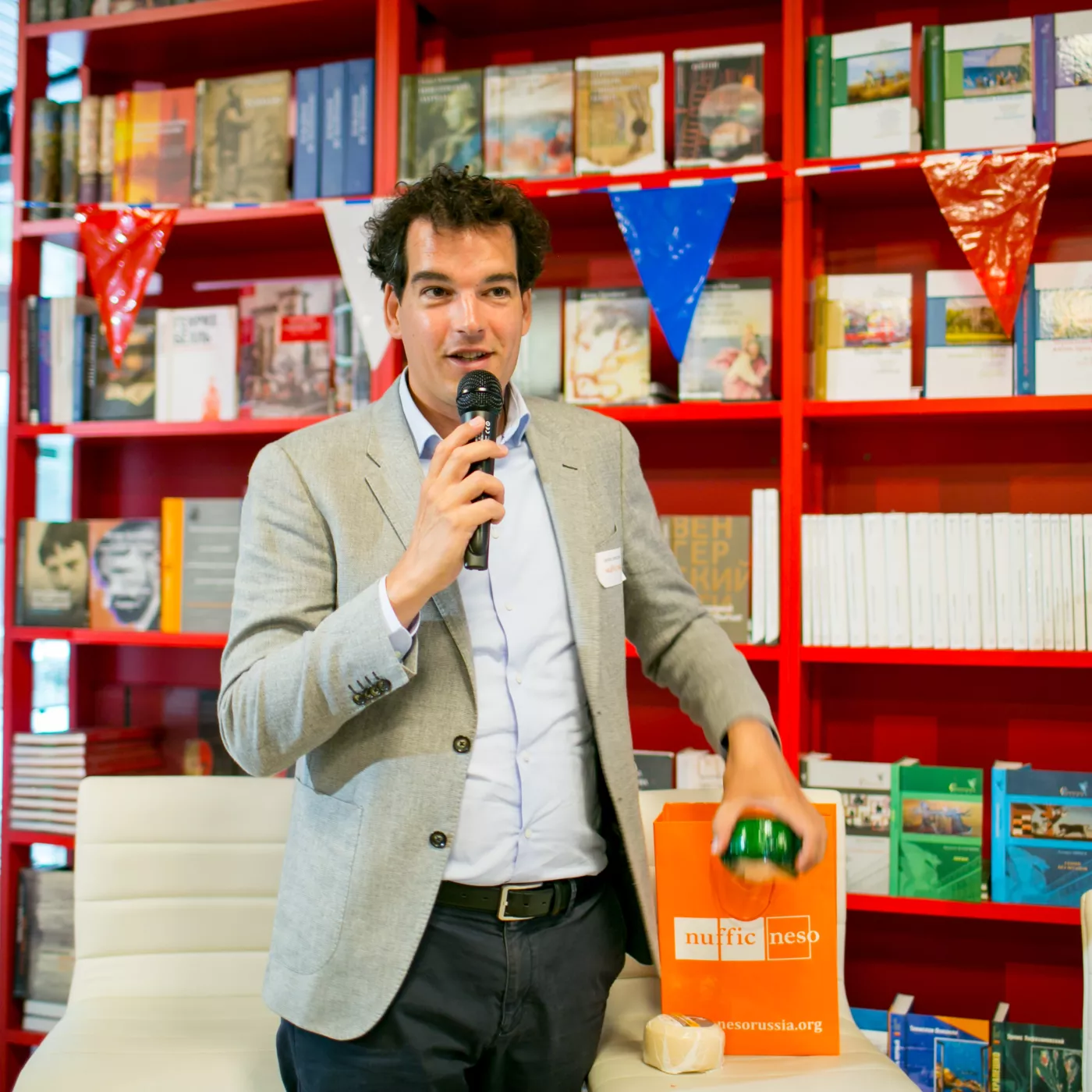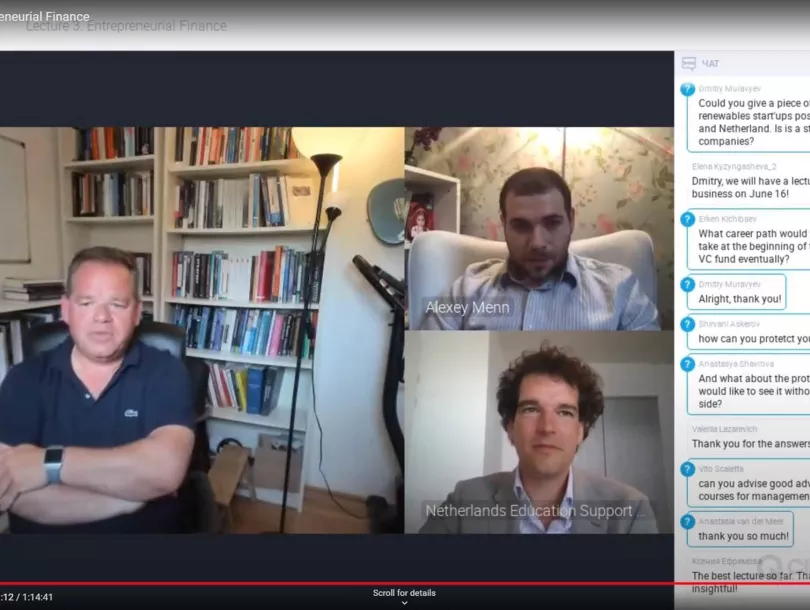Webinars on Entrepreneurship cement Dutch and Russian bonds

‘Entrepreneurship and New Venture Management’ paired academic experts from the Netherlands with highly-respected experts on entrepreneurship from Russia. It was a resounding success, mainly due to the high quality of the course content, but also because the lectures were broadcasted live.
The seven-lecture series was the brainchild of Professor Hein Roelfsema and Jerke Verschoor, head of Nuffic Neso Russia. Professor Roelfsema, who is Leading Researcher in entrepreneurship at the National Research University Higher School of Economics (HSE University) in Russia, set up the course curriculum. The initiative was supported by the Netherlands Embassy in Moscow.
Online collaboration
“We began talking about this online collaboration initiative during the Neso Russia 10th anniversary celebrations in October 2019,” says Professor Roelfsema. “When corona broke out, Jerke and I decided that we should immediately proceed with an online-only initiative.”
"The embassy put us in contact with a number of very high-profile Russian experts on entrepreneurship."
They both began contacting their respective networks. Professor Roelfsema concentrated on the content of the lecture series. He sealed commitment from several academics, highly-qualified to speak on entrepreneurship. Jerke Verschoor, meanwhile, reached out to the Dutch embassy. “The embassy put us in contact with a number of very high-profile Russian experts on entrepreneurship,” says Verschoor. “And in the end, both the Ambassador of the Netherlands to Russia, Rob Swartbol, and the former Russian Deputy Prime Minister of the Russian Federation and current chairman of Russia's Silicon Valley, the Skolkovo foundation, Arkady Dvorkovich, also participated in the course, alongside 15 other academics and experts.”
The Magnificent Seven
Each of the seven lectures featured a duo of a Dutch academic with a Russian expert or academic. Roelfsema designed the course and gave one of the lectures (Entrepreneurial Finance), while Verschoor hosted the sessions. The lectures ranged from the practical ‘Designing an Effective Business Model’ and ‘Entrepreneurial Finance’ to more theoretical material such as ‘Entrepreneurial Ecosystems’ and ‘Family Businesses vs. Corporate Entrepreneurship’.
The series was innovative in several ways, explains Roelfsema: "Firstly, the lectures were live. I felt it was very important to have live interaction between the speakers, but also live interaction from the students. Initially I was opposed to recording the sessions, as I felt the special attraction of a live event made it more like a real lecture series in an auditorium. The idea was also to create the community feeling with a live event."

"This initiative well illustrates how our Neso office can be the link between academia, business, students, young potentials, and governments."
Roelfsema admits his opinion has since changed: “I am now very pleased we recorded them!” he says. “The lectures are of a particularly high quality and I would like this course to be used as part of a Massive Open Online Course.”
Deep dive, not marketing
“This course was all about the content,” he says. “Sometimes when Dutch academics speak abroad, it can be rather like a marketing exercise for their educational institutions. Not this series. We had Dutch academics paired with extremely competent and qualified Russian experts who were talking about both the theory and practice of entrepreneurship.”
This was not a comparison of cultural systems, but a deep dive into a specific series of subjects. “This was not the Dutch explaining to the Russians how they organise entrepreneurship,” says Roelfsema. “It was applying a theoretical lens to how things are done in the Netherlands, and then a look at how that actually works when applied in practice in today's Russia. And the Russian experts had quite a lot to say about it! The Russian speakers were more based in the practical too: investors, entrepreneurs, ecosystem builders. This helped to bring the lecture series to life: making the connection between theoretical knowledge and the practical implications.”
The series was well-received, says Nuffic Neso's Verschoor: “The response was excellent. Over 1,300 people registered and on average 300 people attended each session. They all gave lively presentations, and the experts commented on them and brought in their own views. They chatted with the students in the Q&A sessions and were very open about challenges and opportunities. This initiative well illustrates how our Neso office can be the link between academia, business, students, young potentials, and governments.”
‘Entrepreneurship and New Venture Management’ paired academic experts from the Netherlands with highly-respected experts on entrepreneurship from Russia. It was a resounding success, mainly due to the high quality of the course content, but also because the lectures were broadcasted live.
One of the young potentials who followed the course was 21-year-old Law student Ilya Loginov, who studies Law at Penza State University in the city of Penza, some 650 kilometres south of Moscow. His ambition is to be part of building a company that changes the way people live.
Sobering reality check
“It's great to learn from people with experience of investing in start-ups and creating their own businesses,” says Loginov. “It was also interesting to hear from people who study entrepreneurial processes. Furthermore there was also a motivational part: I was inspired to work on some of my own ideas thanks to the course.” Loginov says the course also brought him down to earth somewhat: “My biggest takeaway was a sour truth - all good enterprises make losses for a pretty long time, it's highly unlikely to make quick profits,” he says. “That was a sobering reality check for me.”
As online education increases in popularity and scope, Professor Roelfsema has some words of advice for educational institutions considering setting up such a venture: “Start small, and learn as you go on,” he says. “But do start! Don't try and plan everything. Aim for perhaps half of what you hope to achieve, and then a lot of things will evolve by themselves.” Roelfsema adds that he sees potential for similar collaborative lectures series in other regions such as Africa and Latin America.
The COVID-19 pandemic provided an unexpected benefit for the lecture series, adds Roelfsema: “The quality of online content has improved massively recently. Everyone is much more used to communicating online. People have learned how to present themselves well, and have invested in a decent microphone and webcam. You get much closer to the lecturers in some respects and you can really see people: their eyes and facial expressions. Consequently, it's almost better than being present in a lecture hall or a classroom.”
As Dutch footballer Johan Cruyff famously said: “Every disadvantage has its advantage.”
Watch all lectures
All lectures are published on Neso Russia's YouTube page.
Want to know more?
Interested in other events (and possibly new MOOCs) Nuffic Neso organises for your students, follow us on Facebook.